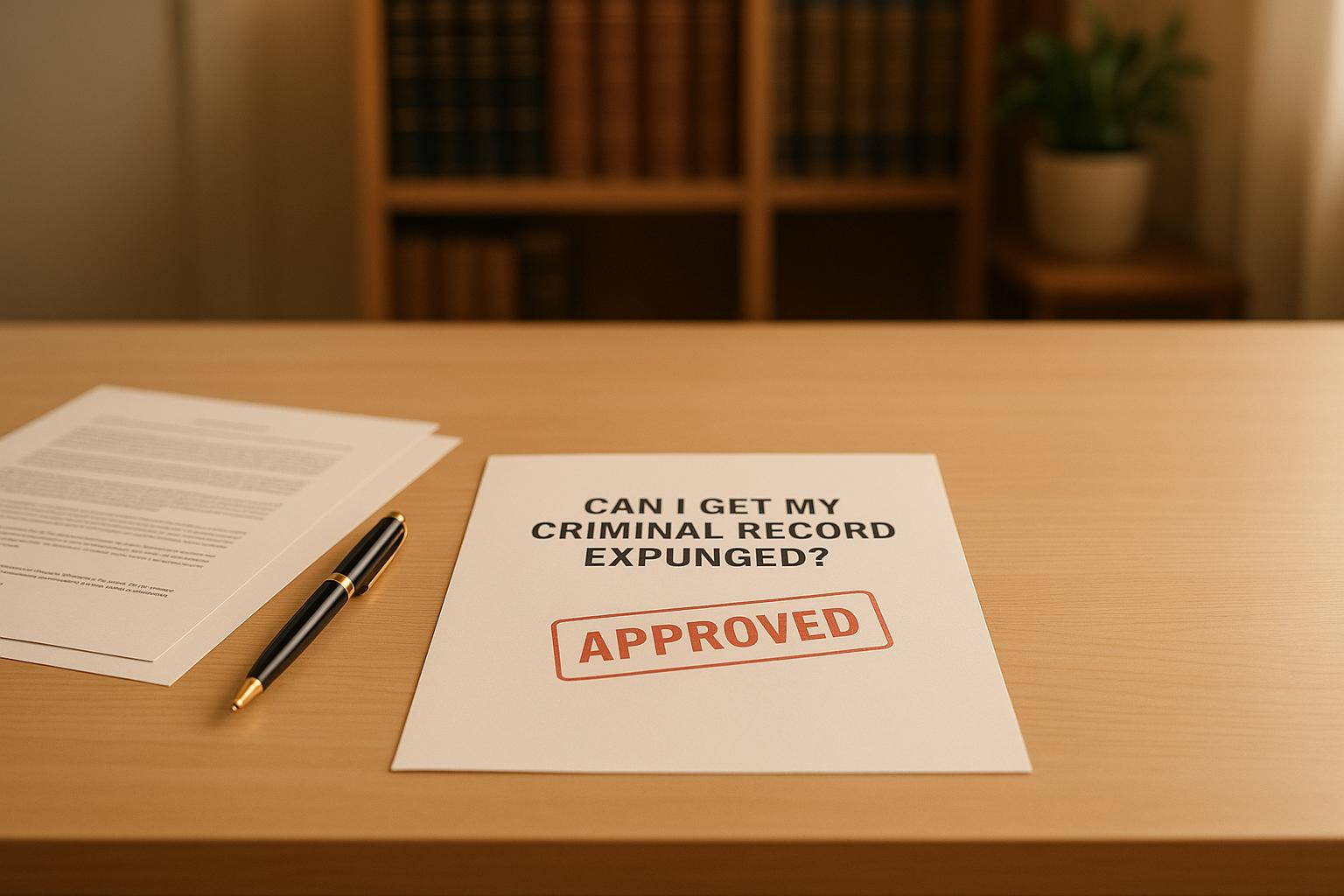If you’ve ever wondered whether you can erase your criminal record, here’s the deal: In South Carolina, certain arrests, charges, or convictions can be expunged, meaning they’re sealed from public view. This can help you in job searches, housing applications, and even accessing education opportunities. However, not all offenses qualify, and the process involves specific steps, fees, and waiting periods.
Here’s a quick rundown of what you need to know:
- What qualifies for expungement? Dismissed charges, first-offense minor misdemeanors, simple drug possession, and certain youthful offender convictions may qualify. Serious crimes like DUIs, most traffic offenses, and felonies generally do not.
- Key requirements: You must meet waiting periods (e.g., 3 years for most misdemeanors), remain conviction-free during that time, and resolve any pending charges.
- Costs: Expect to pay $310 in fees unless your charges were dismissed without a plea deal. Fee waivers may apply in specific cases.
- Timeline: The process can take up to 6 months after submitting your application.
- How to apply: Confirm eligibility with your county’s Solicitor’s Office, complete the application, pay the fees, and wait for a decision.
While you can handle this process yourself, consulting an attorney can improve your chances of success, especially since rules vary by county. If approved, expungement gives you a chance to move forward without the shadow of a past record.
Who Qualifies for Expungement in South Carolina
South Carolina law allows expungement for certain offenses under specific conditions. Here’s a breakdown of which crimes may qualify and the requirements you need to meet.
Crimes That Can Be Expunged
- Dismissed Charges: Charges that are dismissed, no-billed, or nol prossed can be expunged. For dismissals after 2009, the process is often automatic. Older cases may require a formal application.
- Minor Misdemeanors: Offenses punishable by up to 30 days in jail or a $1,000 fine, including some domestic violence (CDV) cases, qualify after a conviction-free period of three years (five years for CDV).
- First-Offense Drug Charges: Simple possession charges can be expunged three years after completing the sentence, provided there are no other convictions. For possession with intent to distribute (PWID), a 20-year waiting period applies, with no additional drug or felony convictions.
- Youthful Offender Act Convictions: Individuals under 25 at the time of conviction may qualify for expungement five years after completing their sentence, including probation or parole, if no other convictions occur. This option is intended to help young adults move forward.
- Fraudulent Check Misdemeanors: A first offense can be expunged after one year without any new convictions.
- Failure to Stop for a Blue Light: This is the only expungable traffic conviction. A three-year conviction-free period is required.
- Charges Dismissed After Diversion Programs: Completing programs like Pre-Trial Intervention, Alcohol Education, or Traffic Education makes related charges eligible for expungement.
"South Carolina must grow its workforce if our state is to experience continued economic growth and prosperity. Simple mistakes, including low-level nonviolent offenses, should not result in lifelong sentences." – Carlos Phillips, Greenville Chamber President and CEO
While many offenses qualify, there are strict limits on what cannot be expunged.
Crimes That Cannot Be Expunged
- Traffic Convictions: Most traffic offenses, such as speeding tickets and DUIs, are not eligible. The sole exception is a first-offense failure to stop for a blue light.
- Fish and Wildlife Violations: Convictions for these offenses are permanently barred from expungement.
- Felony and Serious Crimes: The law focuses on minor, nonviolent offenses, so felony convictions and serious crimes are excluded.
- Multiple Drug Offenses: If you have more than one drug-related conviction, you are ineligible, even if one of the charges might otherwise qualify (e.g., first-offense PWID).
Other Requirements You Must Meet
Meeting the offense-specific criteria is just the first step. Additional conditions include:
- Waiting Periods: These vary by offense, such as one year for fraudulent checks, three years for most misdemeanors, and 20 years for PWID charges.
- No Additional Convictions: You must remain conviction-free during the waiting period, including avoiding out-of-state charges.
- Resolved Charges: Any pending criminal charges must be addressed before applying.
- Age Requirement for Juvenile Offenses: Applicants seeking expungement of juvenile offenses must be at least 18 years old.
- Fees: Expungement applications require upfront payment of fees, including $250 to the Solicitor’s Office, $25 to SLED, and $35 to the Clerk of Court.
- One Expungement Rule: In most cases, you are allowed only one expungement in your lifetime. If you have multiple eligible offenses, it’s crucial to plan carefully.
- Solicitor’s Office Approval: The Solicitor’s Office has discretion over approval. Proper documentation and adherence to procedures can improve your chances.
- Multiple Offenses from One Incident: If multiple eligible charges stem from the same event or sentencing, they may count as a single expungement, preserving your one-time opportunity.
How to Apply for Expungement: 5 Steps
In South Carolina, applying for expungement involves a structured process that varies slightly by county. Here’s a step-by-step guide to help you navigate it.
Step 1: Confirm Your Eligibility
Before diving into the application, gather your arrest and conviction records to determine if you’re eligible. Reach out to the Solicitor’s Office in the county where your charges originated to confirm whether your offense qualifies for expungement. Provide details about your arrest, charges, and outcomes. If you’re missing documentation, make sure to obtain certified copies before proceeding. For non-convictions handled in Magistrate or Municipal Court, contact the clerk’s staff in that court rather than the Solicitor’s Office. Once the Solicitor’s Office verifies your eligibility, you can move forward with the application process.
Step 2: Complete the Application
Each of South Carolina’s 46 counties has its own expungement procedures. Obtain an application packet from the Solicitor’s Office in the circuit where the offense occurred – not where you currently reside. Review the packet thoroughly to ensure you understand the requirements and confirm your eligibility one last time. The application will ask for your personal details, case information, and the reason for your expungement request. In most cases, hiring an attorney isn’t necessary.
Step 3: Submit Your Application and Pay the Fees
Submit your completed application either in person or by mail, depending on your county’s guidelines. Include a valid photo ID and the final disposition documentation for each charge you want expunged. Along with your paperwork, you’ll need to pay the following nonrefundable fees using certified payment methods:
- $250 administrative fee to the Solicitor’s Office
- $25 SLED verification fee to SLED (if applicable)
- $35 filing fee to the county Clerk of Court (if applicable)
Some Solicitor’s Offices offer financial assistance programs that can cover up to 50% of the application fee, so be sure to inquire when submitting your application. Check your county’s specific submission times and locations for more details.
Step 4: Wait for Processing
Once your application is submitted, the Solicitor’s Office will review it to confirm your eligibility. They may request additional information if necessary. This step requires patience, as processing times can vary.
Step 5: Receive Your Decision
If your application is approved, the Solicitor’s Office will issue a court order for expungement. This order instructs all relevant agencies – such as police departments, courts, and SLED – to destroy or seal records related to your charges. Keep copies of this court order as proof of expungement.
If your application is denied, you have the right to contest the decision. An attorney can help you understand the reason for denial and guide you on whether to appeal or reapply after addressing any issues. Keep in mind that this process typically counts as your one-time expungement opportunity. However, if multiple offenses from the same incident are eligible, they may be treated as a single expungement, preserving your ability to apply again in the future. By following these steps, you can clear eligible records and take control of your personal history.
Expungement Costs and How Long It Takes
Understanding the costs and timeline involved in the expungement process can help you plan ahead and avoid surprises. Here’s a breakdown of the fees and how long the process typically takes.
Fees You’ll Need to Pay
In South Carolina, expungement comes with three mandatory, non-refundable fees that range from $60 to $310. These payments must be made separately using certified checks or money orders:
- $250 administrative fee to the Solicitor’s Office
- $25 SLED verification fee to the South Carolina Law Enforcement Division
- $35 filing fee to the Clerk of Court
These fees are non-refundable, no matter the outcome of your application. Free expungements are possible if your charges were dismissed, marked as "nol prossed" (not prosecuted), or resulted in a "not guilty" verdict – unless the dismissal was part of a plea agreement. If your General Sessions charges were dismissed as part of a plea deal, you’ll still need to pay the $250 administrative fee.
In cases where charges are dismissed without a plea agreement, the expungement is free. Additionally, some Solicitor’s Offices may cover up to 50% of the fee. If you were falsely accused due to identity theft, you may qualify for a fee waiver with proper documentation.
Keep in mind there may be additional costs, such as obtaining certified copies of court documents, which usually cost between $5 and $15 per document.
How Long the Process Takes
Once you’ve submitted your application and paid the fees, the expungement process in South Carolina can take up to six months from the time the Expungement Office receives your completed paperwork. The exact timeline depends on factors like the complexity of your case, the accuracy of your application, and the current workload of the agencies involved. In some cases, backlogs may extend the process beyond six months.
To avoid delays, double-check that your application is complete and includes all required documents. If you change your address during the waiting period, notify the Expungement Services Office immediately to ensure you receive your final expungement order.
Once the process is finalized, you’ll receive a certified true copy of your expungement order, a list of agencies that have updated their records, and an instruction letter by mail.
sbb-itb-ce0cbb0
Getting Legal Help with Your Expungement
South Carolina’s expungement process can feel overwhelming, as it involves intricate rules and procedures. Having a knowledgeable attorney by your side can make a big difference in protecting your rights and simplifying the process. The South Carolina Bar underscores the importance of seeking legal representation for any legal issue.
"You are strongly encouraged to seek the advice of an attorney in any legal matter."
Expungement laws vary across judicial circuits, which can make your case more complicated. Understanding your criminal record and determining what can be expunged under South Carolina law often requires legal expertise. A skilled attorney can help you interpret your record, identify eligibility, and handle all the legal steps necessary to clear your record if you qualify.
How Brendan M. Delaney Law Firm LLC Can Help

For those seeking expert legal assistance, Brendan M. Delaney Law Firm LLC offers dedicated support. Based in the upstate of South Carolina, the firm focuses on criminal defense, family law, and personal injury cases. With over 24 years of experience, the firm has a deep understanding of South Carolina’s legal system, including expungement cases.
The firm prioritizes a personalized approach. Brendan M. Delaney takes the time to listen to clients, examine their legal issues thoroughly, and create legal strategies tailored to each individual’s situation. This client-centered method is critical since the specifics of your record directly impact your eligibility and the legal strategy required.
To make the process more accessible, the firm offers free initial consultations. During this meeting, you can discuss your case, receive professional advice on your expungement eligibility, and learn about the best legal strategy for your situation.
Other Resources for Expungement
If you’re looking for additional legal help, the South Carolina Bar’s Lawyer Referral Service can connect you with an attorney experienced in expungement cases. You can reach them at 803-799-7100.
For those unable to afford a private attorney, the South Carolina Legal Aid Telephone Intake Service (LATIS) is available at 1-888-346-5592. This service can help you access legal aid if you meet their income qualifications.
Your local Solicitor’s Office is another valuable resource. Each county’s expungement office is located within its circuit solicitor’s office. For instance, the Seventh Circuit Solicitor’s Office manages expungements for Cherokee and Spartanburg Counties. These offices handle most expungements, except for non-convictions in Magistrate or Municipal courts. While the Solicitor’s Office prepares and processes expungement orders, you may choose to hire an attorney to oversee the process.
Solicitor offices also provide circuit-specific guidelines and application forms, which is essential since expungement rules can differ depending on your location in South Carolina. Combining these resources with professional legal guidance can help ensure a smoother and more efficient expungement process.
Key Points About Expungement in South Carolina
Expungement in South Carolina can open doors to better job and housing opportunities by limiting public access to certain arrests, charges, or convictions. This means that during background checks, these records won’t be visible, helping to remove potential barriers. However, your eligibility for expungement depends on specific factors.
The type of charge plays a major role in determining eligibility. Typically, you may qualify if your case was dismissed, if you were charged with a misdemeanor carrying a maximum penalty of 30 days in jail and/or a $1,000 fine, or for certain first-time offenses. On the other hand, serious crimes like DUIs and violent offenses cannot be expunged.
Fees for expungement are standard, but some counties offer discounts of up to 50%. Dismissed charges are usually free to expunge unless the dismissal was part of a plea deal.
It’s also important to note that timelines for eligibility vary depending on the type of charge and the county. Each offense has a required waiting period before you can apply, so make sure to check the specific timeline for your situation.
Applications are handled by your county’s Solicitor’s Office, and the process can differ by judicial circuit. To get started, request a copy of your criminal record from SLED to confirm the details. Then, reach out to your local Solicitor’s Office for guidance tailored to your case. Since expungement laws can be complex and vary by county, consulting a legal professional can greatly improve your chances of success. Always review the rules carefully and seek legal advice to ensure you meet all requirements.
FAQs
What should I do if my expungement application is denied in South Carolina?
If your expungement application is denied, the first step is to figure out why. Take a close look at any documents or feedback you received. This information can shed light on what went wrong and help you decide how to move forward.
It’s also a good idea to consult with a qualified attorney. They can assess your case, explain your options, and help you take the right steps. Depending on the situation, you might be able to reapply if something in your circumstances changes, correct any mistakes, or even explore other legal paths like seeking a pardon. With the right guidance, you can better navigate the process and improve your chances of success down the road.
Are there exceptions to South Carolina’s one-time expungement rule?
Yes, South Carolina does make exceptions to the one-time expungement rule under certain conditions. For example, individuals convicted of specific misdemeanors carrying a maximum penalty of 30 days in jail and/or a fine of up to $1,000 may still be eligible for expungement. Similarly, victims of human trafficking who were convicted of nonviolent offenses, such as trafficking or prostitution, can also qualify for expungement, even if other restrictions might typically apply.
Since every situation is different, it’s crucial to consult a legal professional who can assess your eligibility and guide you through the process.
How can an attorney help me successfully expunge my criminal record?
Hiring an attorney can make a big difference when you’re trying to expunge your criminal record. The process isn’t always straightforward – it involves understanding who qualifies, following legal procedures, and handling a mountain of paperwork. A skilled attorney can take the stress off your shoulders by ensuring every document is filled out properly and submitted on time, helping you avoid mistakes that could slow things down or result in denial.
Beyond paperwork, an attorney offers personalized guidance based on your unique circumstances. They’ll advocate for you throughout the process, tackle any legal roadblocks, and help you navigate the system more smoothly. With their expertise, you’ll have a better chance of clearing your record and getting a fresh start.





